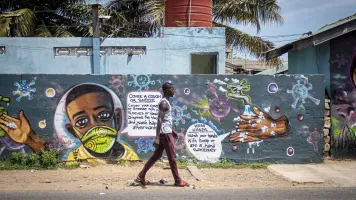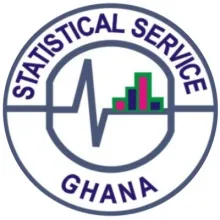When the Ghana Statistical Service, Vodafone Ghana, and the Flowminder Foundation dreamed up their Data for Good partnership, no one knew a global pandemic would soon put it to work.
During the 2017 Ghana National Data Roadmap process, which was supported by the Global Partnership for Sustainable Development Data, the Ghana Statistical Services (GSS) re-kindled conversations with key stakeholders – resulting in the establishment of a public-private partnership with Vodafone Ghana and the Flowminder Foundation, with support from Hewlett Foundation. The partnership aims to harness anonymized and aggregated mobile data to advance the production of official statistics. This new data source provides useful insights into Ghanaians’ mobility, making it useful for public health planning and disaster preparedness, among other things. And now, authorities are making use of this data to inform their COVID-19 responses.
In an effort to slow the spread of the virus, on March 30, 2020 the government of Ghana closed schools, banned public gatherings, and implemented a lockdown in some parts of the Greater Accra and Greater Kumasi Metropolitan Areas. As governments across the globe continue to search for the best methods to tackle the Coronavirus pandemic, GSS is making use of the Data for Good partnership, taking advantage of this unique opportunity to leverage the data for urgent emergency response. By using anonymized and aggregated mobile phone data, data scientists were able to produce rapid mobility estimates to gain high-level insights into how these restrictions affected people’s movements, providing a critical and timely look at the lockdown’s effectiveness.
On April 3, GSS released Mobility analysis to support the Government of Ghana in responding to the COVID-19 outbreak, a report that details these initial insights. By looking at the change in the count of active mobile phone subscribers in various districts on a particular day, officials can monitor the volume of movements within and across districts. For example, the below chart shows the total number of trips between all districts four weeks before the COVID-19 restrictions went into effect, through the second day of lockdown. According to the data, when the lockdown was imposed, the number of trips fell sharply to slightly over half of the average number of trips during the previous four weeks. This indicates that the lockdown was effective at achieving the government’s aim of restricting movement.

“Understanding changes in mobility patterns is important for the government in order to establish whether the current restrictions are likely to contain the spread of the disease and whether more or different interventions should be put in place in the coming days or weeks,” said Professor Samuel Kobina Annim, Ghana’s Government Statistician.
And this was just the beginning. On May 15, GSS released a second report, extending initial analyses to provide a picture of mobility throughout the country since lockdown measures were lifted on April 20. By again utilizing anonymized and aggregated mobile phone data, data scientists were able to conclude that after the lockdown was lifted, mobility levels still remain lower than levels prior to the implementation of initial restrictions. This can be seen clearly in the below maps that show changes in the number of trips between districts across various timeframes.

Noting the critical policy implications of these additional findings, Professor Samuel Kobina Annim stated: “The observation that mobility after the partial lockdown was lifted remains at levels lower than mobility during the periods of the baseline and the initial restrictions, including sanctioning social distancing and adherence to public health hygienic protocols; endorses the effectiveness of the use of moral suasion as a complementary intervention in the fight against COVID-19. Residents in Ghana deserve commendation for not reverting to the ways of living prior to the imposition of the initial restrictions and are therefore urged to continue with change in behaviour in order to contain the epidemic.”
When the Data for Good Partnership was formed, its primary focus was to strengthen humanitarian and development decision-making in Ghana. The scale and urgency of the current pandemic could not have been foreseen, but the partnership has thus far proven to provide access to data and insights that will continue to help inform decision-makers as they make critical choices on interventions to flatten the curve in Ghana.




